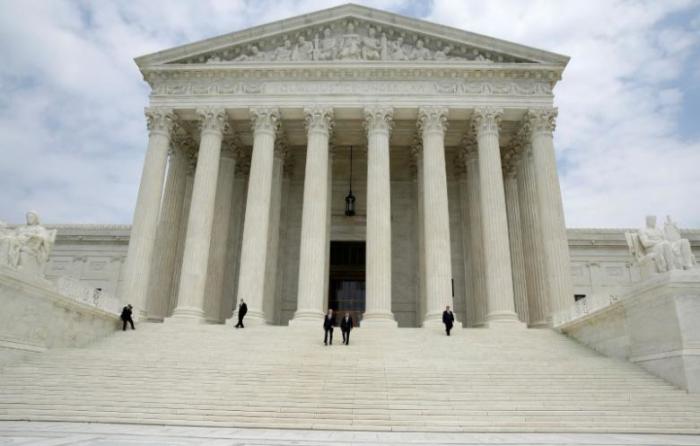Supreme Court declines to hear Oregon parents' case challenging school's transgender bathroom policy

The United States Supreme Court has declined to hear an appeal from Oregon parents seeking to invalidate a school district’s policy allowing trans-identified students to enter facilities designated for the opposite sex.
The Supreme Court denied the petition for certiorari submitted by the plaintiffs in the case Parents for Privacy v. Barr, who argued that an Oregon school’s policy allowing trans-identified students to use bathrooms, locker rooms and showers that correspond with their gender identity as opposed to their biological sex violated students’ “fundamental right to bodily privacy” under the Due Process Clause of the 14th Amendment to the U.S. Constitution as well as Title IX of the Civil Rights Act of 1964.
Parents for Privacy v. Barr was one of several cases that the court declined to take up Monday. With the Supreme Court’s denial of certiorari, a previous ruling on the matter from the Ninth Circuit Court of Appeals remains in place. The Ninth Circuit ruling affirmed a lower court ruling that decided “there is no Fourteenth Amendment fundamental right to privacy to avoid all risk of intimate exposure to or by a transgender person who was assigned the opposite biological sex at birth.”
Parents for Privacy filed a lawsuit following the adoption of a Student Safety Plan by Dallas School District No. 2 based in Dallas, Oregon. As stated in the Ninth Circuit ruling, the Student Safety Plan was implemented “after a student who had been born and who remained biologically female publicly identified as a boy, and asked school officials to allow [her] to use the boys’ bathroom and locker room.”
The Student Safety Plan acknowledged the student as a “transgender male” and complied with the request to use boys’ bathrooms and locker room.
Before the implementation of the Student Safety Plan, the trans-identified student used a gender-neutral bathroom to change before gym class but asked to use the boys’ bathrooms and locker room, citing the gender-neutral restroom’s long distance away from the gym and fear of being noticed by other students.
Parents of three current and former Dallas students maintained that the policy caused “embarrassment, humiliation, anxiety, intimidation, fear, apprehension, and stress produced by using the restroom with students of the opposite sex.”
“The key to this whole thing is not just the privacy and the rights of just one student. It’s the rights of all the students and their parents and you can’t interpret federal law and state law and impose it on everyone else and say you’re accommodating everyone — because you’re not accommodating everyone,” said Herb Grey, the plaintiffs’ attorney, at the time.
Those who oppose allowing trans-identified students to use facilities that correspond with their gender identity instead of their sex point to a 2018 incident in Georgia as a cause for concern. In 2018, the mother of a 5-year-old girl who attended the City Schools of Decatur reported that her daughter was sexually assaulted by a boy in the girls’ bathroom who was allowed to use the bathroom as a result of the school district’s bathroom policy for trans-identified students.
In a separate incident, an 18-year-old high student in Rhinelander, Wisconsin, was arrested in March on charges of fourth-degree sexual assault for exposing his genitals to a child in the school’s gender-neutral bathroom.
The Supreme Court’s refusal to take up Parents for Privacy v. Barr comes less than six months after the court ruled in Bostock v. Clayton County, Georgia that sexual orientation and gender identity were protected classes under federal civil rights law. Allowing students to use restrooms and locker rooms in accordance with their gender identity could become more widespread should presumptive President-elect Joe Biden take office on Jan. 20, 2021.
Biden has vowed to restore an Obama-era guidance that allowed trans-identified students to use bathrooms, locker rooms and showers that correspond with their gender identity. In addition, Biden has pledged to make the passage of the Equality Act a top priority during his first 100 days in office.
According to the legislation, “an individual shall not be denied access to a shared facility, including a restroom, a locker room, and a dressing room, that is in accordance with the individual’s gender identity.” In other words, the Equality Act would implement the Student Safety Plan of Dallas School District No. 2 and similar measures adopted by other schools nationwide on a federal level.
The Equality Act already passed the Democrat-controlled House but failed to pass the Republican-controlled Senate. Passage of the Equality Act will depend on the results of the two Senate runoffs in Georgia on Jan. 5, 2021, that will determine control of the U.S. Senate.
If Democrats win both Senate seats and Biden wins the presidency as projected, the Democrats will have complete control of the federal government, making the passage of the Equality Act more likely. Should Republicans win one or both of the Senate races, they will maintain control of the Senate, dramatically decreasing the likelihood that the legislation will become law.





























